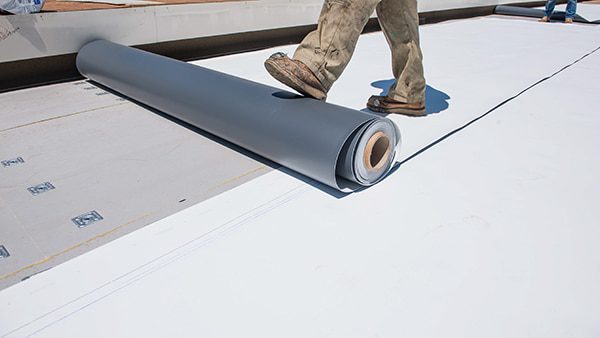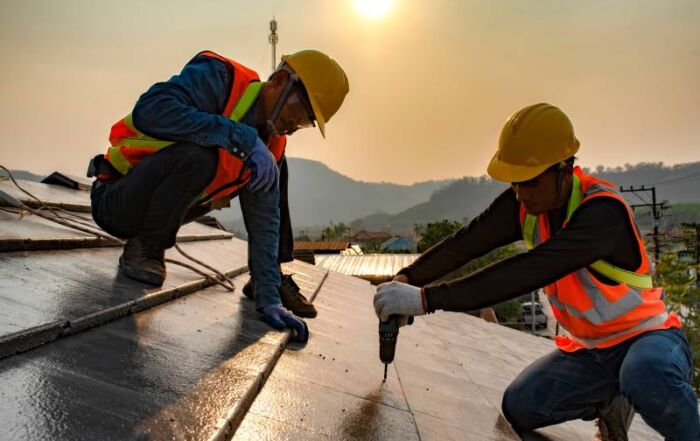
What Is TPO Roofing? Exploring Its Benefits and Suitability
When pondering the question, “What is TPO roofing?”, it’s essential to understand the various facets of this roofing choice. When choosing roofing materials for your property, it is in your best interest to have as much information as possible. Your roof is a long-term investment and should therefore come with peace of mind.
In addition to selecting the best materials, look out for certified and experienced contractors. Roofing contractors who care more about getting paid too quickly should be avoided. They do not have your best interest at heart.
Why is this important? The best roofing materials can suffer irreparable damage if poorly installed.
TPO Roofing Explained: What You Need to Know
Thermoplastic Polyolefin (TPO) is a fast-growing single-ply synthetic roofing material consisting of one sheet of rubber layer and a scrim– a chemically bonded fabric that helps with its durability.
The TPO roofing installation process begins with the contractor removing old roofing materials. Following this, the surface undergoes thorough cleaning and preparation. Subsequently, TPO is rolled out onto this prepped surface. Using either specialized adhesives or a hot air gun, the TPO membrane is then sealed firmly in place.
TPO’s availability in various thicknesses caters to different needs. For instance, commercial TPO membranes often measure 0.080 inches in thickness and have dimensions of 3ft by 12ft. In contrast, residential TPO usually ranges between 0.045-0.060 inches thick and spans 6.5ft in width.
TPO Roofing Cost and Longevity
TPO roofing costs can be influenced by several factors: the size and condition of your roof, the specific type of insulation you prefer, the chosen installation method, and overall accessibility to the roof.
Although TPO typically costs between $5-$8 per square foot, a more accurate estimate considers the insulation type. For TPO roofing installation, methods include mechanical fastening, welding, or ballasting the material onto the roof.
With optimal installation and care, the lifespan of TPO roofing material can stretch up to 30 years. This longevity, however, can be influenced by local weather conditions and maintenance practices. Designed to resist UV radiation and other harsh environmental factors, TPO doesn’t easily succumb to chemical reactions, which translates into potential energy savings and reduced damage risks. When compared to alternative synthetic materials, TPO’s resilience stands out. Especially when two ends are welded together, a durable, water-resistant seam forms, ensuring prolonged protection.
Pros and Cons of TPO Roofing
Pros
- The first advantage of the TPO material is its UV protection. You won’t have to worry about any increase in your HVAC bills even during hot weather seasons. The white color ensures the color keeps them out and keeps your interior cooler.
- The TPO flexibility reduces the chances of breakage or another type of damage, if installed and properly maintained, you won’t be needing another roof in the next 2-3 decades.
- Unlike many other roofing materials, the TPO contains no chlorine and can be recycled to manufacture TPO sheets again which makes it environmentally friendly.
Cons
- The primary concern with TPO revolves around inconsistencies in manufacturing quality. Different manufacturers continually tweak their production processes, which can sometimes lead to variances in durability.
- Some TPO varieties, despite their thickness, might not be as robust or long-lasting as others. In certain instances, instead of the expected 20-30 years, TPO roofs might show signs of wear in just a decade.
- Additionally, the size of TPO sheets, especially when considered smaller, can introduce challenges. Excessive seaming might cause the material to contract or loosen, potentially enabling water ingress.
Is TPO Roofing Right for You?
Although TPO is commonly used for commercial buildings, and experts predict commercial to be the largest market by 2026, the TPO has been adopted by many homeowners over the years. First, for its curb appeal and energy-saving features, and second, for its affordability.
Whether it is right for you or not, however, will depend on the following factors:
- Your roof type: The TPO is generally suitable for a flat or low-level roof. If a contractor insists that you use this membrane on another type of roof surface, then you might want to reconsider their intentions for you.
- Residential or commercial: Some manufacturers roll out different materials for these two purposes. The commercial TPO is mostly thicker than the residential materials. Your roof contractor should be able to identify each.
- Your budget: The TPO roofing material is relatively cheap. However, when combined with the insulation and installation, you may arrive at a different result.
Final Thoughts on TPO Roofing
No roofing material has a lifetime immunity, they all require maintenance to survive threats and live up to their life expectancy. Therefore, creating a maintenance plan will help you catch defects quickly and fix them. Curious about modern roofing options? Discover what is TPO roofing and more at Perkins Roofing.




